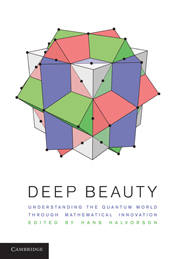Book contents
- Frontmatter
- Contents
- Contributors
- Preface
- Acknowledgments
- Introduction
- I Beyond the Hilbert Space Formalism: Category Theory
- II Beyond the Hilbert Space Formalism: Operator Algebras
- III Behind the Hilbert Space Formalism
- 9 Quantum Theory and Beyond: Is Entanglement Special?
- 10 Is Von Neumann's “No Hidden Variables” Proof Silly?
- 11 Foliable Operational Structures for General Probabilistic Theories
- 12 The Strong Free Will Theorem
- Index
12 - The Strong Free Will Theorem
from III - Behind the Hilbert Space Formalism
Published online by Cambridge University Press: 01 June 2011
- Frontmatter
- Contents
- Contributors
- Preface
- Acknowledgments
- Introduction
- I Beyond the Hilbert Space Formalism: Category Theory
- II Beyond the Hilbert Space Formalism: Operator Algebras
- III Behind the Hilbert Space Formalism
- 9 Quantum Theory and Beyond: Is Entanglement Special?
- 10 Is Von Neumann's “No Hidden Variables” Proof Silly?
- 11 Foliable Operational Structures for General Probabilistic Theories
- 12 The Strong Free Will Theorem
- Index
Summary
Introduction
The two theories that revolutionized physics in the twentieth century, relativity and quantum mechanics, are full of predictions that defy common sense. Recently, we used three such paradoxical ideas to prove “The Free Will Theorem” (strengthened here), which is the culmination of a series of theorems about quantum mechanics that began in the 1960s. It asserts, roughly, that if indeed we humans have free will, then elementary particles already have their own small share of this valuable commodity. More precisely, if the experimenter can freely choose the directions in which to orient his apparatus in a certain measurement, then the particle's response (to be pedantic—the universe's response near the particle) is not determined by the entire previous history of the universe.
Our argument combines the well-known consequence of relativity theory, that the time order of spacelike separated events is not absolute, with the EPR paradox discovered by Einstein, Podolsky, and Rosen in 1935 and the Kochen–Specker Paradox of 1967 (see [5]). We follow Bohm in using a spin version of EPR and Peres in using his set of thirty-three directions, rather than the original configuration used by Kochen and Specker. More contentiously, the argument also involves the notion of free will, but we postpone further discussion of this to the last section of the chapter.
- Type
- Chapter
- Information
- Deep BeautyUnderstanding the Quantum World through Mathematical Innovation, pp. 443 - 454Publisher: Cambridge University PressPrint publication year: 2011
- 7
- Cited by



